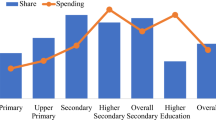Abstract
This paper investigates both supply (the number of employees in the PT industry and the number of PT institutions) and demand (the number of middle and high school students, grade 7–12). Panel data are used for this research, making it possible to analyze market growth over time since it contains both cross-sectional and time-series information. Also this research sheds light on regional differences (urban socio-economic factors) which influence the growth of the PT market. Fixed effects and random effects regression models are developed to analyze the panel data. The purpose of this study is to analyze whether the changes in the demand for PT affect the growth of PT market between 2001 and 2006 in 25 gu (borough) of Seoul. Urban economic and industrial structures and income were controlled because they are known to influence the PT market along with demand for PT.
Similar content being viewed by others
References
Aurini, J. (2004). Educational entrepreneurialism in the private tutoring industry: Balancing profitability with the humanistic face of schooling. The Canadian Review of Sociology and Anthropology, 41(4), 475–492.
Biswal, B. P. (1999). Private tutoring and public corruption: A cost-effective education for developing Countries. Developing Economies, 37(2), 222–240.
Bray, M. (1999). The shadow education system: Private tutoring and its implications for planners. Fundamentals of educational planning–61. UNESCO: Paris France.
Bray, M., & Kwok, P. (2003). Demand for private supplementary tutoring: conceptual considerations, and socio-economic patterns in Hong Kong. Economics of Education Review, 22, 611–620.
Choi, S. (2003). Research on private tutoring cost and its reduction. Policy Research Project, no. 19. Korea Educational Development Institute (KEDI), Seoul, Korea.
Greene, W. (1993). Econometric analysis (2nd ed.). Englewood Clifss: Prentice Hall.
Hausman, J. A. (1978). Specification tests in econometrics. Econometrica, 46(6), 1251–1271.
Kim, T. (1998). The evaluation for the essence and reduction policy of private education expenses. Seoul: Korea Educational Development Institute.
Korea Consumer Agency. (1997). Survey on private tutoring expenditure.
Korea National Statistics Office (KNSO). (2008, 2009). Inquiry result of private tutoring.
Lee, J., & Kim, S. (2002). Economic Analysis of Education Policies and Private Tutoring in South Korea. Analysis of Korean Economy, 8(2).
Lee, Y., & Woo, C. (eds.). (2004). Private tutoring cost distribution, effect, demand and its influence based on household character. Private tutoring cost distribution, effect, demand and its influence. Korea Development Institute (KDI): Seoul, Korea.
Lee, J. (2007). Two words of private tutoring: The prevalence and causes of afterschool mathematics tutoring in Korea and the United States. Teachers College Record, 109(5), 1207–1234.
Nath, S. R. (2008). Private supplementary tutoring among primary students in Bangladesh. Educational Studies, 34(1), 55–72.
Yoo, H. (2006). Analysis of private tutoring cost expenditure. The HRD Reviews, 9(2), 172–185.
Author information
Authors and Affiliations
Corresponding author
Rights and permissions
About this article
Cite this article
Kim, KM., Park, D. Impacts of urban economic factors on private tutoring industry. Asia Pacific Educ. Rev. 13, 273–280 (2012). https://doi.org/10.1007/s12564-011-9192-7
Received:
Revised:
Accepted:
Published:
Issue Date:
DOI: https://doi.org/10.1007/s12564-011-9192-7




